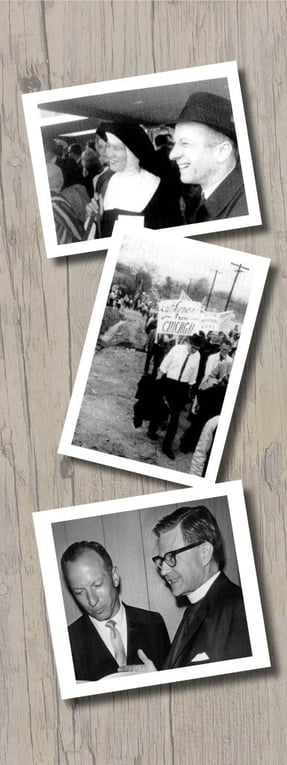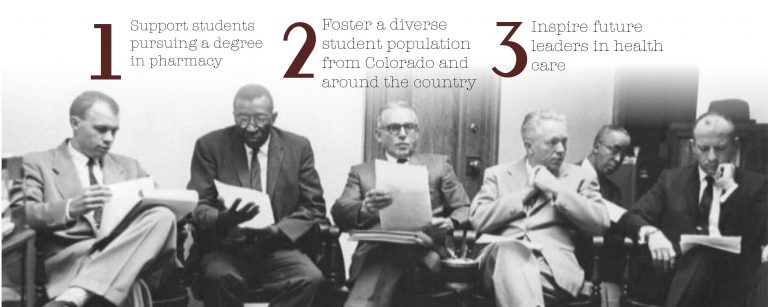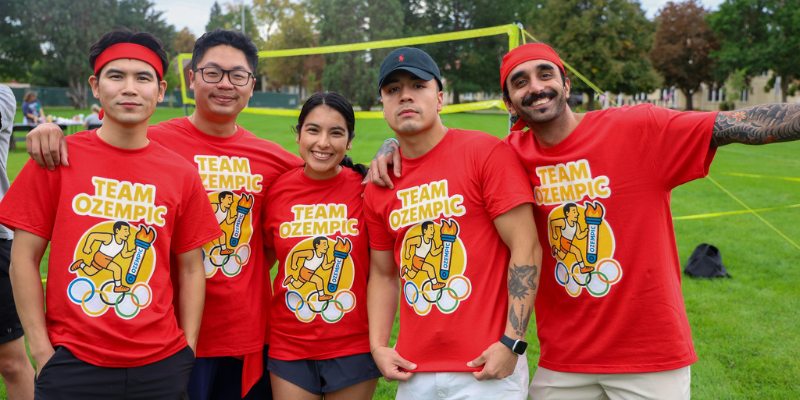When Sheldon Steinhauser returned to Alabama for the first time in 55 years and crossed the Edmund Pettus Bridge in Selma, he couldn’t help but feel the pain his fellow protestors suffered there so many years before.
Steinhauser, who served as the senior director of development for the CU Skaggs School of Pharmacy and Pharmaceutical Sciences before retiring in 2015, joined Martin Luther King, Jr. in 1965 along with thousands of protestors in historic marches from Selma to Montgomery. He heard that a white truck driver tried to run down an African American Colorado state senator and he learned water spigots in the city had been turned off to prevent the protestors from having access to drinking water. African American community members were the only people who offered them water.
Throughout his lifetime, Sheldon "Shelly" Steinhauser
has remained committed to diversity. (Images courtesy
of Shelly Steinhauser and the CU Anschutz
Office of Advancenment.)
“The experience of being part of that is something I take with me for all of my life,” he said. “You go through an experience like this and you feel a sense of fear, just being in an alien place, you feel the admiration and respect for the African Americans who risked their own standing and their own lives.”
Steinhauser returned to Alabama in February as part of his role as scholar-in-residence for the Anti-Defamation League.
While he was there, Steinhauser thought most about Congressman John Lewis, the late Civil Rights icon who crossed the bridge only to be beaten so badly by state troopers that his skull was fractured. After a legendary career in public service, Lewis died July 17.
“He was the person I thought of the most during that time, and it was so painful,” Steinhauser said. “That’s when I really understood the pain that people like him, who did the Bloody Sunday march, had to experience physically and emotionally. I could appreciate what they went through and how terrible the suffering was.”
In 1965, Steinhauser was part of the third of three protests from Selma to Montgomery and joined the protests after the Bloody Sunday march across the bridge. By joining a group of Coloradans who traveled to Selma to support the protests, he and others became even more committed to the movement that eventually led to the passage of the Voting Rights Act of 1965.
During the march, he had a chance to meet King – “that was one of the great moments of my life,” he said.
Steinhauser also watched Rep. Lewis with admiration as his legacy grew in the years after the marches.
“He is one of the great heroes of the movement that I respect and admire so much for what he chose to do with his life, right from the very beginning as a student and right to the very end as a congressperson,” Steinhauser said. “He just lived up to the ideals so fully that there’s a reason why he has been getting the kind of incredible memorials and funeral services that were beamed across the world. He was so respected for his integrity, his commitment, his dedication to human rights and to people, generally.”
In his own career, Steinhauser championed diversity at home in Colorado, from his first job out of college with the Anti-Defamation League to his role at the CU Skaggs School of Pharmacy and Pharmaceutical Sciences, one of his last before retirement.
Through the years, he worked as the director of the Allied Jewish Federation, president of workplace diversity consulting firm Sheldon Steinhauser & Associates and taught courses on aging and social issues at Metropolitan State University of Denver.
When former CU Pharmacy Dean Louis Diamond first approached Steinhauser about joining the school as the development director, he knew it would be a perfect fit.
“My life is really devoted to diversity, and so, there was a natural attachment to the school of pharmacy,” he said. “The school of pharmacy was the most diverse institution on the entire health sciences campus and whether you walked the halls or just came to work every day, you realized how important diversity was and how the school had responded to the importance of diversity.”
To honor his commitment to diversity, CU Pharmacy created the Sheldon and Jan Steinhauser Diversity Scholarship, which is awarded every year to support future generations of diverse pharmacy professionals. Steinhauser is also the recipient of the Distinguished Coloradan Award, which is the school’s most prestigious award, bestowed annually upon individuals who have made significant contributions in their careers to the profession of pharmacy.
Today, Steinhauser, who will turn 90 in August, said he is proud to stay connected to the school through his colleagues and the scholarship.
Steinhauser said he is inspired to see a new generation make history and change under duress.
“You have an incredible combination of race and injustice and a pandemic and terrible economic insecurity, all interrelating now in our lifetime, and yet, you see people out there who are willing to put their lives on the line, still, to protest and to make their voices felt,” he said. “It’s an inspiration.”
Learn more about the Sheldon and Jan Steinhauser Diversity Scholarship.
.png)



